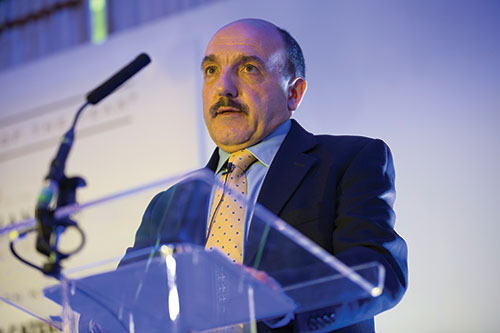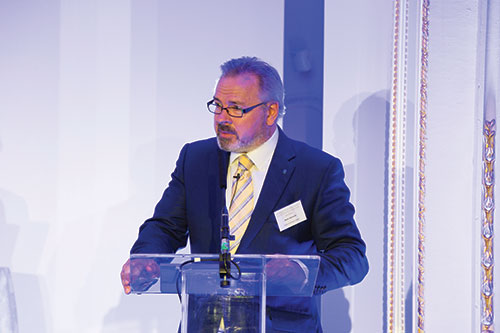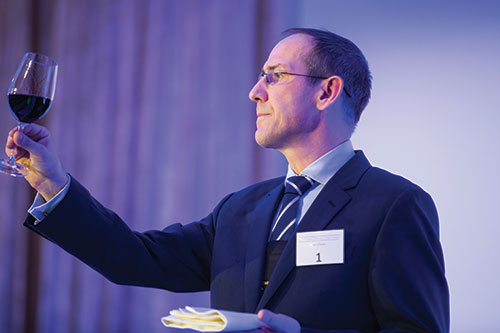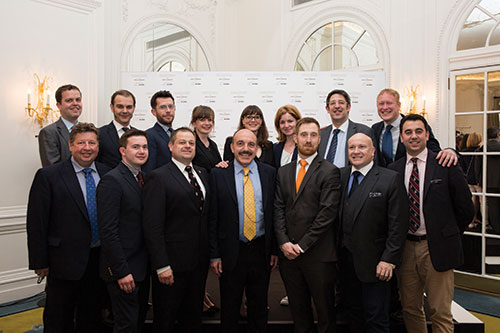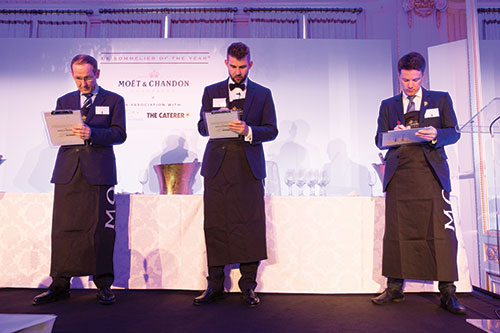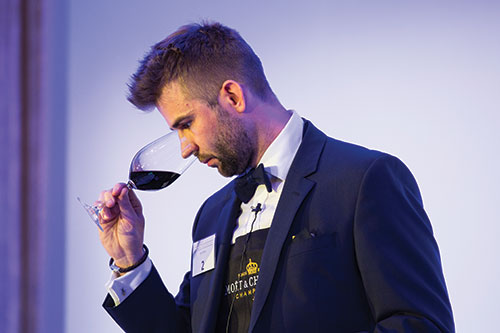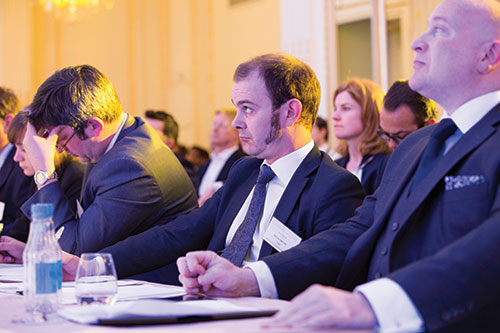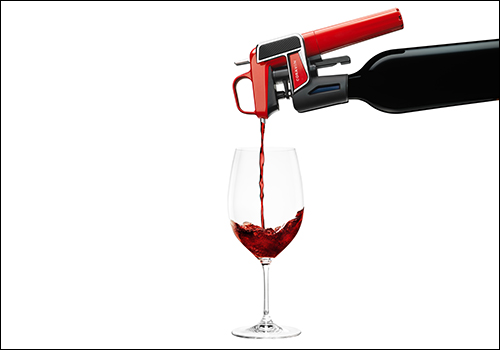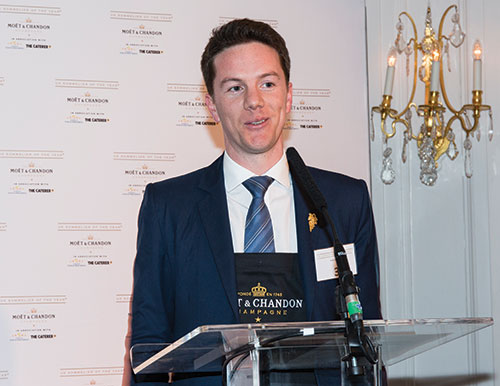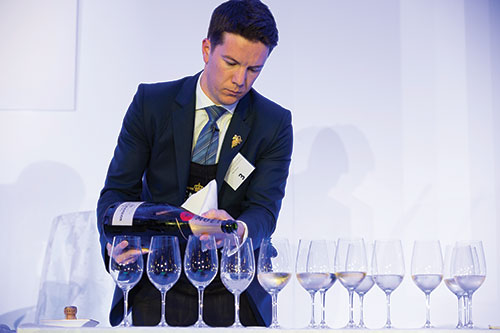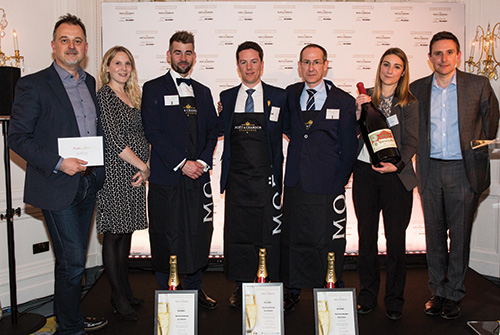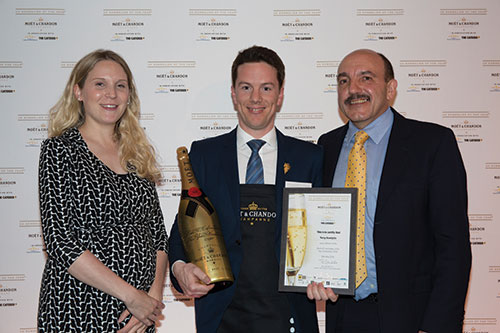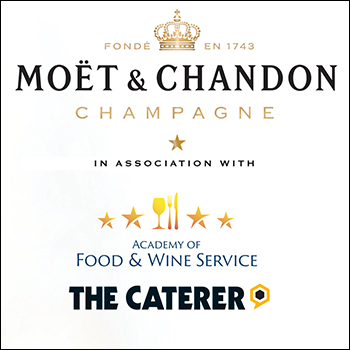Premier crew: the Moët UK Sommelier of the Year 2016 final
The standards at the 36th year of the Moët UK Sommelier of the Year competition were higher than ever, according to the judges. Fiona Sims took a front row seat in a tense final to see some of the brightest talent in the wine world battle it out for the title
Marie, the head sommelier at London's Coq d'Argent, is in the final of the MoÁ«t UK Sommelier of the Year, now in its 36th year. Run by the Academy of Food & Wine Service and The Caterer, it's the Bocuse d'Or of the sommelier world. The aim? To find the sommelier with the best booze knowledge and the most outstanding technical skills.
The competitors put in many hours of prep before the competition, a fair few returning after having competed in previous years. After scoring at least a 75% pass mark on a questionnaire, the competitors went through to the regional finals, where they had to complete a written paper, a blind tasting and an oral service bit. From this the competitors were whittled down to nine for the final, along with last year's runners up, and the winner of the 2016 ChaÁ®nes des Rôtisseurs Young Sommelier of the Year.
The 12 finalists spent the morning completing a series of tricky tasks set by Gerard Basset, which included a blind tasting, a questionnaire, a series of snappy questions and a service skills test. Six were then eliminated based on the results of these tasks.
Chief judge Gerard Basset
"They all have different strengths and weaknesses, but the standard is high this year, so it's hard to choose at this stage," whispers judge Jan Konetzki, head sommelier at Gordon Ramsay restaurant and winner of the competition in 2012, before taking his place at the judges' table for the afternoon session.
Judges include some of the best sommeliers in the business, many of them past winners, who scrutinise the contestants under the watchful eye of chief judge Gerard Basset, who has more letters after his name than anyone else in the industry - something master of ceremonies, Pride of Britain Hotels chief executive Peter Hancock, can't resist sending up before announcing the finalists.
MC Peter Hancock
And then there were three. "And you start from scratch, you understand?" announces Basset, after the last three finalists are announced on stage. Joining Marie is Terry Kandylis, head sommelier of 67 Pall Mall and Jess Kildetoft, head sommelier of Mash London, who will spend the next three hours swirling their stuff in front of a packed audience.
What will they do, exactly? Spot errors on a wine list, give a full organoleptic description of a couple of wines, plus one more diner-friendly description of a sparkling wine, identify grape varieties in four wines from the same country, and identify four wines in black glasses.
Then, after a short break, comes the service test. Three tables of judges posing as diners in a restaurant offer each competitor the same set of tasks to carry out, from decanting wine to food and wine matching. Finally, there's a quick-fire quiz, where finalists have to guess the producer behind a label, or identify a winemaker or iconic vineyard, and the now trademark finale, the magnum pour (more of which later).
Even without the audience gazing on, this is tough. The contestants get 30 seconds to work out what's wrong with a series of three wines singled out on an imaginary wine list flashed up via a screen on stage - it could be a wrongly attributed cuvée, appellation or vintage. Here's two they were given: Klein Constantia Vin de Constance, Constance, South Africa, 2013 (answer: the 2013 has not been released yet); Argiano, Solengo, Brunello di Montalcino, DOCG, Tuscany, Italy, 2009 (answer: Solengo is an IGT, not a Brunello). See what I mean?
"Make us dream," asks Basset of the competitors, when asked to describe the sparkling wine in the glass in front of them for three long minutes. "It's a Champagne for sure, based mainly on Chardonnay, with a lovely toastiness and delicate citrus lemon notes on the nose, with a lot of complexity. I'd have this with everything from oysters to foie gras. And if you have your kid's birthday coming up, then why not give them a bottle of vintage MoÁ«t & Chandon from their birth year - who wouldn't prefer that to a car?" quips Kildetoft, with a playful nod to the sponsor in a sneaky bid to gain more points.
"That's a great choice, madam," praises Kandylis, when diner/judge Kathrine Larsen MS orders a bottle of 1999 Hermitage from Chave, giving her nuggets of information about the producer and suggesting a lamb dish if she hasn't already chosen her dish to match.
Larsen then throws a googly and grills Kandylis about the suzukii fly (an Asian fruit fly that attacks the vines, and is a growing problem in some wine regions). "It has been a bit of a problem for winemakers, but there is a natural way to beat it with pheromones," explains Kandylis, elegantly.
Kandylis also impresses on the last restaurant task - to choose a different iconic wine from a different country in the New World for each of the four courses. Instead of rushing this, as the other contestants do, often forgetting it should be a New World wine, he asks if it's OK to take a moment to consider this first, returning with strong pairing suggestions, which win over the judges.
The finale is always a crowd-pleaser - the magnum pour. The finalists have just seven minutes to pour equal amounts of Champagne - MoÁ«t, of course - into 16 glasses (not flutes, interestingly, but white wine glasses). "You can't go back once you've finished pouring a glass," warns Basset.
Marie looks like he will finish short - and he does, by three glasses, eliciting a Gallic shrug. Kildetoft has some Champagne left over in the bottle, prompting a deep frown, while Kandylis manages a neat finish, one that helps him to take the top spot, as it turned out.
"I know everyone always says this, but I really think that the level gets higher every year. I love the interactiveness of it, and that element has increased every year. More people come to watch now than ever before. Every sommelier should consider entering, if only to better their knowledge. There is no higher accolade than to be judged by your peers," enthuses sommelier judge Xavier Rousset at the glittering awards ceremony after.
"It's one of the hardest years I've seen," agrees judge Ronan Sayburn MS, wine director at 67 Pall Mall, whose head sommelier, Kandylis, made it through to the final so he has to step down from judging for this last leg.
"It's great to see the dedication - the competition is such an institution now," he continues. "I think it's important for sommeliers to enter - it improves your knowledge and ultimately the service in restaurants. Customers benefit, employees benefit, so what's not to like?" You heard the man.
The MoÁ«t UK Sommelier of the Year 2016 competitors
- Serdar Balkaya, head sommelier, Royal Automobile Club
- Ladislav Basta, head sommelier, the Kitchin
- Romain Bourger, head sommelier, the Vineyard at Stockcross
- Mathias Camilleri, head sommelier, the Five Fields restaurant
- Tamas Czinki, head sommelier, Northcote
- Remi Fischer, head sommelier, Old Course hotel
- Terry Kandylis, head sommelier, 67 Pall Mall
- Jess Kildetoft, head sommelier, Mash London
- Olivier Marie, head sommelier, Coq d'Argent
- Christopher Parker, assistant head sommelier, Lime Wood
- Petri Pentikainen, sommelier and assistant restaurant manager, the Three Chimneys restaurant
- Niels Sluiman, assistant head sommelier, Restaurant Sat Bains
And now for the science bit: Coravin explained
Anyone attending the final would have noticed that there was a Coravin element in the competition for the first time this year, and each of the three finalists were asked to explain how the gadget worked to 'diners' seated at the 'restaurant' in the service section.
Why?
Because it has changed the way we drink wine.
What is it?
In a nutshell, Coravin is a needle-through-the-cork system that enables you to siphon wine out of bottles without spoiling what's left. Argon gas is the other string to its bow. Having pushed the needle through the cork, you pull a trigger to inject argon through the needle at a considerable pressure. Once the bottle is pressured, you can pour the wine by the splash, or the glass - your choice.
The wine left in the bottle never comes in to contact with oxygen, and the cork reseals itself in just a few minutes, thanks to its natural elasticity. You could in theory drink from the same bottle over a period of years. Genius, right? And Manna for your wine-focused restaurant.
The Coravin was invented by nuclear physicist Greg Lambrecht, who once worked in the medical device industry. It took 10 years to develop and was launched in 2013, first in the US, then the UK and France, and it has now reached the rest of the globe.
Who buys it?
Collectors, sure, and restaurants, obviously. It allows establishments, such as 67 Pall Mall, to serve an eye-popping 523 fine wines by the glass, which is probably why Kandylis was able to explain Coravin so well, observed judge Wilkin, helping him to scoop the top spot.
"He showed the 'guests' the mechanism, talking through exactly how it worked. That was impressive," he recalled. And how much does a Coravin cost? Around £269.
For more information, visit coravin.com
Meet the winner - Terry Kandylis
"It hasn't really sunk in yet," says 33-year-old Terry Kandylis, MoÁ«t UK Sommelier of the Year 2016. It's a pretty international club that he has joined. Since June Schmidt-Lowe took the very first UK Sommelier of the Year trophy back in 1980, there has been a predictably hefty swathe of French winners since then, who have thankfully, for Britain, made the UK their home. But it's a first for a Greek - and a first for a former physics major. "Yes, I followed a rather different career path," grins Kandylis, head sommelier of new private members' club 67 Pall Mall.
Kandylis hails from Evia, Greece's second-biggest island after Crete. It was while studying at Athens University that he got the wine bug - working in restaurants to support his college life. "I was about halfway through my physics degree when I realised that I was more interested in the restaurant industry," says Kandylis.
Much to his mother's annoyance, he left to work in the industry full-time, encouraged to focus on wine by the people he met along the way, and ended up working as a sommelier at Athens' then only two-Michelin-starred restaurant, Spondi.
"But I always had in my mind a move abroad, and London was the most tempting destination for me. I wanted to expand my horizons as the wine market was a little restricted in Athens, so I applied for a job at the Fat Duck," explains Kandylis.
He worked under Fat Duck head sommelier Isa Bal for two-and-a-half years. "The attention to detail was something else, but as it's all about the tasting menu at the Fat Duck, and because back then there weren't many changes to the wine pairing suggestions, I decided to move to London."
Kandylis is a big fan of Brett Graham's cooking at the Ledbury, so he jumped on a job there, staying for another two-and-a-half years, working under Anja Breit. "She offered me more responsibility, I really helped to build up that cellar, plus we got to open some serious bottles," he remembers.
Then Master Sommelier Ronan Sayburn got in touch about a little project that he was working on called 67 Pall Mall. The private members' club in Whitehall, which opened last year, is a wine lover's heaven. With its staggeringly low mark-ups (15%-20%, compared with the more usual 75%), plus a projected 5,000-bin list, in addition to the 523 wines by the glass already on offer (thanks to Coravin, see box on page 43), it was a no-brainer for Kandylis. "I would have been stupid to refuse. I get to talk to a sophisticated wine crowd here. We cover all the major areas as well as obscure corners - we're about halfway through building the cellar," he reveals.
Add to that the fact that the sommelier team at 67 Pall Mall is 10-strong and includes four national champions, and it should come as no surprise that Kandylis took the top spot. "We are all competitive - we all push each other, and I like that," he says.
"It's the third time I've entered the competition but the first time I've reached the finals and it's been a great learning process. It's definitely been a high point of my career. My mother is happy for me now - she can see I'm doing something I really love," he adds.
So where do you see yourself in the future? "I haven't really thought about it. I'd like to get more involved with Greek wine, helping to establish the image of it globally, so that might be something you'll see me doing.
"Greek wine has a strong future, and there's already a lot of interest around the world, although it is still in its infancy. I couldn't possibly tell you my favourites - that would get me into a lot of trouble - but I can point you towards my favourite regions. For whites, Santorini. If I had to live anywhere in Greece, it would be there. For reds, Naoussa - it's the Greek Piedmont. It's a case of watch this space on all counts," smiles Kandylis.
What the judges thought
"Terry was the most consistent, and on some tasks he was sensational. He was great on the Coravin section, and brilliant on the food and wine pairing suggestions. But the key for me was that Terry took his time. Asking the 'diners' whether he could take a moment to have a think about those wines and matches, when faced with the request from the host that the table would like him to choose only iconic New World wines, each from a different country - in a real restaurant situation he would probably have said, 'can I take a moment to go and talk to the chef?'. He came back with interesting and logical wine selections."
Gerard Basset MS, MW, MBA, OBE, head judge (winner 1989, 1992)
"The standard was the highest ever, I think. It was particularly difficult this year, particularly the questionnaire. Jess was an exceptional taster, and Olivier is always so calm and determined, showing that this is not a young man's game, as many people might think. But Terry was so controlled in the service section and his food and wine matching was outstanding. I was particularly impressed with the way he made time for his tasks on stage. The more you pause, the more you open up your memory. Terry just went that one step further. We were looking for consistency throughout and Terry had the edge."
Matt Wilkin MS (winner, 2005)
"Has it got any harder? I think today's competitors have more access to information. That said, the tasting session and the errors on the wine list were tough for all of them. But Terry stood out in service - from the way he went about decanting, and working with the commis, to the food and wine pairing. He was the most interactive with the 'diners'."
Gearoid Devaney (winner, 2008)
"They all did well but Terry's personality shone - I really liked him. Ultimately, it's about whom you want to be served by - and today that was Terry. I was also impressed with the way he shared his knowledge. It's about understanding the guest and developing a relationship with the guest. It's beautiful when it happens."
Eric Zweibel MS (winner, 2004)
"Terry wasn't fazed by anything - he was in control and very focused, particularly in the service part of the competition. I think that's the toughest part - having to perform like that in front of an audience. But I think it's good to put yourself under that kind of pressure - you will grow as a sommelier.'
Tanguy Martin (winner, 2015)
"Maybe I shouldn't say this, but Terry was actually slightly behind in points before he got on that stage. But his food and wine matching put him ahead. He explained his suggestions eloquently and he had presence. But he's very down to earth. We don't want snobbishness in a sommelier."
Roger Jones, restaurateur
In pictures: the MoÁ«t UK Sommelier of the Year 2016 heats >>
The grape escape: the MoÁ«t UK Sommelier of the Year 2016 trip to Épernay >>
Video: Watch the highlights of the MoÁ«t UK Sommelier of the Year 2016 final
Continue reading
You need to be a premium member to view this. Subscribe from just 99p per week.
Already subscribed? Log In



